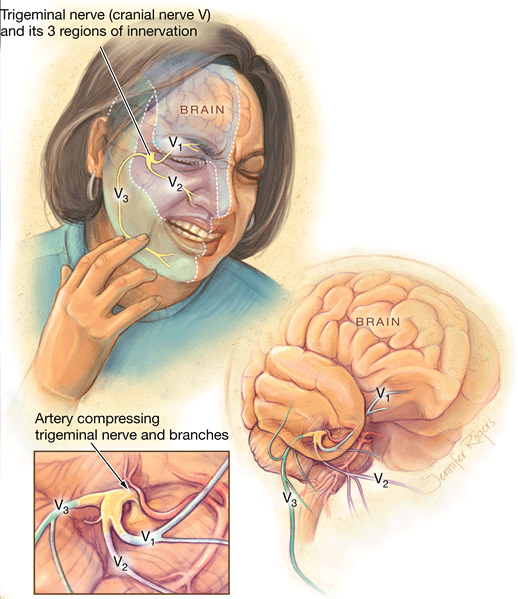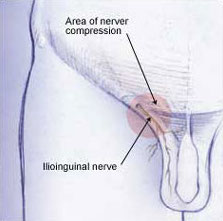The peripheral nervous system is a complex collection of nerve fibres that are present outside the central nervous system i.e. the brain and spinal-cord. They are involved in carrying sensations such as light touch, hot and cold and pain and are responsible for maintaining functions such as bladder control, bowel control and blood pressure. In peripheral neuralgia, damage to these peripheral nerves can occur resulting in pain and other symptoms. The pain can occur in the absence of any form of nerve stimulation, though is often precipitated by some form of injury or disease.

Peripheral neuralgia can affect a number of different sites. Below are some of the common sites affected and the clinical symptoms accompanying them.

The trigeminal nerve is a nerve that arises from the brain, passing through the skull and ultimately supplying the face. Sometimes, the trigeminal nerve can get affected by some form of inflammation resulting in significant pain along its distribution. This is known as trigeminal neuralgia. Patients experience pain along one aspect of the face which can include the cheek, the jaw and sometimes even the eyes.
This condition affects occipital nerves which are run along the back of the head (in particular C2 and C3). It is caused by inflammation and the symptoms that patients experience include severe pain that may be either sharp or shock-like. The site affected is the back of the head and the neck. Occasionally, the patients may have a painful scalp and may experience pain when they are moving the neck.
This form of peripheral neuralgia results in pain within the abdomen. A potential cause is having undergone abdominal surgery or direct trauma to the nerve. Patients typically experience a burning pain with associated numbness (sometimes) along the lower abdomen. This pain can radiate to the inner aspect of the thigh and can include the genital area as well.

The iliohypogastric nerve is another nerve that is present within the abdomen that has a complex course through the body. Damage to this nerve from surgery or from direct trauma can result in neuralgia. Patients complain of a burning abdominal pain immediately following trauma. This pain can radiate to the area just above the genitals (called the suprapubic region) and occasionally the genitalia as well.
The trigeminal nerve is a nerve that arises from the brain, passing through the skull and ultimately supplying the face. Sometimes, the trigeminal nerve can get affected by some form of inflammation resulting in significant pain along its distribution. This is known as trigeminal neuralgia. Patients experience pain along one aspect of the face which can include the cheek, the jaw and sometimes even the eyes.
This information is for educational purposes only and is NOT intended to replace the care or advice given by your physician. Always seek the advice of your physician or other qualified health provider before starting any new treatment or with any questions you may have regarding a medical condition. For more information see our Medical Disclaimer.